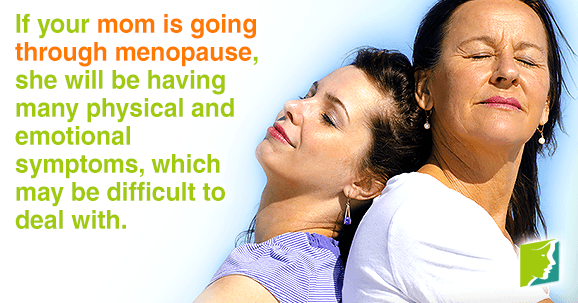Menopause is, in many ways, the opposite of puberty. Where in puberty, girls start getting periods, along with crazy symptoms like acne, growth spurts and changes in body shape, during menopause, women start missing periods, and get symptoms such as hot flashes, night sweats, and mood swings. Menopause usually occurs when a woman is in her 40's or 50's. Both of these transitional phases are caused by drastic hormonal changes occurring in the body. Keep reading to learn what kind of symptoms menopause can cause.
Hot Flashes
Hot flashes sudden sensations of intense heat that come over a woman like waves at unexpected moments throughout the day. They could happen to your mom at any time while she is working, driving, or outside. They can be very stressful and difficult to deal with, and can be incredibly disruptive. Imagine having a sudden random fever in the middle of the day. Not fun. Don't be surprised to find her putting her head in the freezer or putting the AC on in the middle of winter.
Night Sweats
Night sweats are hot flashes that occur at night - which means that women often don't wake up until they're so feverish that they've sweated right through their bed sheets and pajamas. This, aside from being gross, can also be really tiring. Many women are fatigued and exhausted from lack of a good nights sleep, and may become irritable and impatient.
Mood Swings
Fluctuating hormones (estrogen, progesterone, and testosterone) during menopause can cause mood swings. Mood swings are unexpected emotional reactions to things that are generally trivial. These reactions are often unintentional and confusing, and may cause your mom to swap back and forth between emotions so rapidly she begins to feel ill and confused. Just remember, she's struggling with this too, and not in a comfortable place emotionally, so try and be forgiving when you can, and discuss any concerns you have with her at a later time, when she's calmer and has the mood swings a little more under control.
If your mom is experiencing these symptoms, she may be going through menopause. These symptoms can make menopause a difficult confusing time, and hard to deal with, so it is important to understand and support her through this process. Click on the following link to learn about effective treatments for menopause symptoms.
Sources
- BMJ Group. "Menopause: What is it?" Patient Leaflet. 2007.
- Hopkins, Virginia. Lee, John R. M.D. What Your Doctor May Not Tell You About Menopause. New York: Warner Books Inc., 1996.
- Love, Susan M.D. Menopause and Hormone Book. New York: Three Rivers Press, 2003.
- Martin, Raquel. The Estrogen Alternative. Rochester, VT: Healing Arts Press, 2000.




